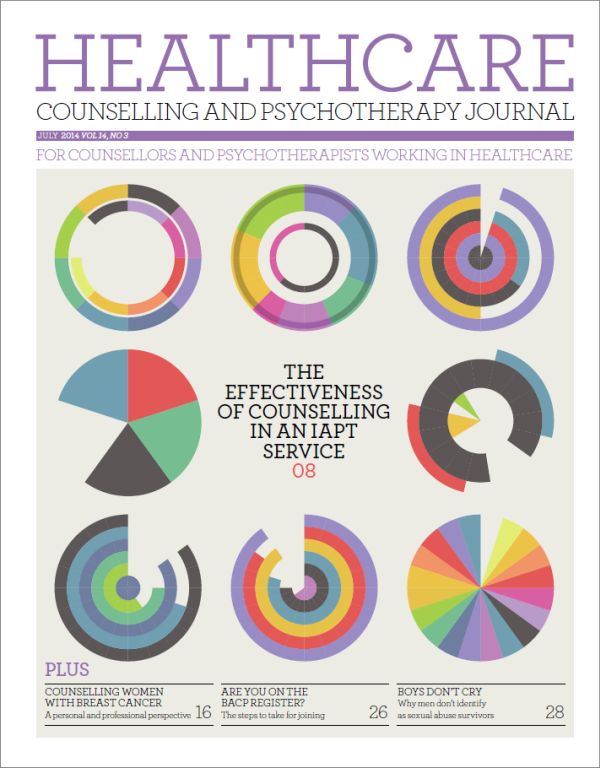In this issue
Features
‘Hold fast that which is good’
In evaluating the effectiveness of counselling within Trafford Psychological Therapies, Sue Balmer, Dale Huey and Jean Mclaren found outcomes were above the IAPT national average.
On being a client through breast cancer
Living with the effects of breast cancer led Cordelia Galgut to challenge the preconceived ideas she had as a therapist.
Healing the split between mind and body
Denise Ham argues for a better understanding of the emotional and psychological impact of a diagnosis of breast cancer.
The embrace
Therapists often help clients with adjustment and acceptance: Elizabeth Baird knows how difficult that can be when diagnosed with a long-term illness – difficult, but possible.
Are you on the Register?
Sally Aldridge explains the routes onto and process for joining the BACP Register.
Boys don’t cry
Billie Andrews asks why men don’t identify as sexual abuse survivors.
Am I going to prison? Or can CBT help?
Kim McConnachie, Habibah Moolla and Elaine Davies report on the pilot service of the offender IAPT project.
CBT training in a mental health trust
Idyli Kamaterou and Rachel Gibson-Dunt explore the effects of CBT training on the work of NHS Trust employees.
Regulars
Chair’s report – BACP Healthcare
Zubeida Ali: Big conversations
Development report – BACP Healthcare
Louise Robinson: Parity plus
GP viewpoint
John Hague: We have some catching up to do
Counselling in primary care
Richard Mason: The price of everything and the value of nothing
Third sector perspective
Michael Lilley: The road to recovery
Resumé
Anne Prendergast

All articles from this issue are not available online. Divisional members and subscribers can download the pdf from the Healthcare Counselling and Psychotherapy Journal archive.
From the editor
BACP’s Research Conference took place during May, featuring two packed days of open debate on the latest research findings in counselling and psychotherapy. That the annual conference will mark its 21st year when it takes place in Nottingham in 2015 shows that counsellors and psychotherapists have always been interested in, and engaged with, research.
It hasn’t historically been the case, however, that research into the effectiveness of counselling and psychotherapy, which has often used qualitative methodology, has met the specific criteria for inclusion in NICE guidance, which includes only studies utilising randomised controlled trials (RCTs). This has been, and continues to be, particularly important in the NHS, where NICE has a huge influence on which psychological interventions are recommended and, therefore, commissioned.
Over the next few years this may change as therapies without a robust RCT evidence base catch up. The development by BACP of the NICE-approved Counselling for Depression (CfD) has led the way for the PRaCTICED trial (Pragmatic Randomised Controlled Trial assessing the non-inferiority of counselling and its effectiveness for depression), which is taking place at the University of Sheffield to evaluate the effectiveness of CfD in comparison with CBT in treating moderate to severe depression in primary care settings.
One of the interesting things about this trial is that, using the same sample, a parallel trial will run alongside the RCT to research what the practitioners bring to the therapeutic encounter that results in better outcomes, regardless of the modality they use. While recognising the methodological rigour of RCTs, the trial therefore also recognises the strengths of practice-based studies and their ability to contribute to the evidence base in a meaningful way.
The introduction of the IAPT programme, and its commitment to collecting practice-based data on therapy outcomes, has already provided all counselling and psychotherapy modalities with an opportunity to prove their worth in routine settings; counselling has fared well, with no difference in recovery rates for depression between counselling and other NICE-approved therapies1.
Our lead feature this issue contributes further to this picture. In evaluating the effectiveness of counselling within Trafford Psychological Therapies, Sue Balmer, Dale Huey and Jean McLaren aimed to supplement NICE-recognised effectiveness research with more practice-based evidence of the demonstrable benefit of non-directive counselling. Using the same metrics as reported within the IAPT national database, they were able to document the performance of the counselling component of their service, and found outcomes were meaningfully above the national average.
Elsewhere in the issue, we feature the personal perspectives of two therapists who are living with and through illness. In her article, Cordelia Galgut writes about how living with the effects of breast cancer, and receiving therapy, led her to challenge her own preconceived ideas about the appropriate way to support clients. And in an update of an article she wrote for us last year2, Elizabeth Baird considers issues of adjustment and acceptance when living with Multiple Sclerosis (MS).
As ever, thanks to all those who have written in this issue of the journal; please do get in touch at the email address below if you’d like to contribute to a future issue.
Sarah Hovington
Editor
hcpj.editorial@bacp.co.uk
References
1 www.iapt.nhs.uk
2 Baird E. Not giving up. Healthcare Counselling and Psychotherapy Journal. 2013; 13(4):20-21.
